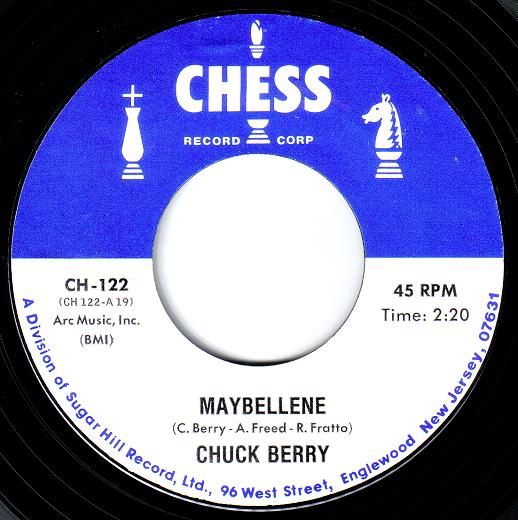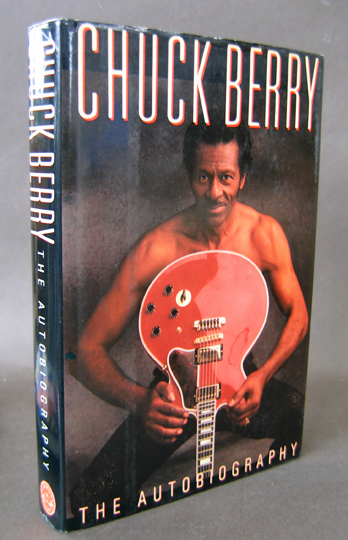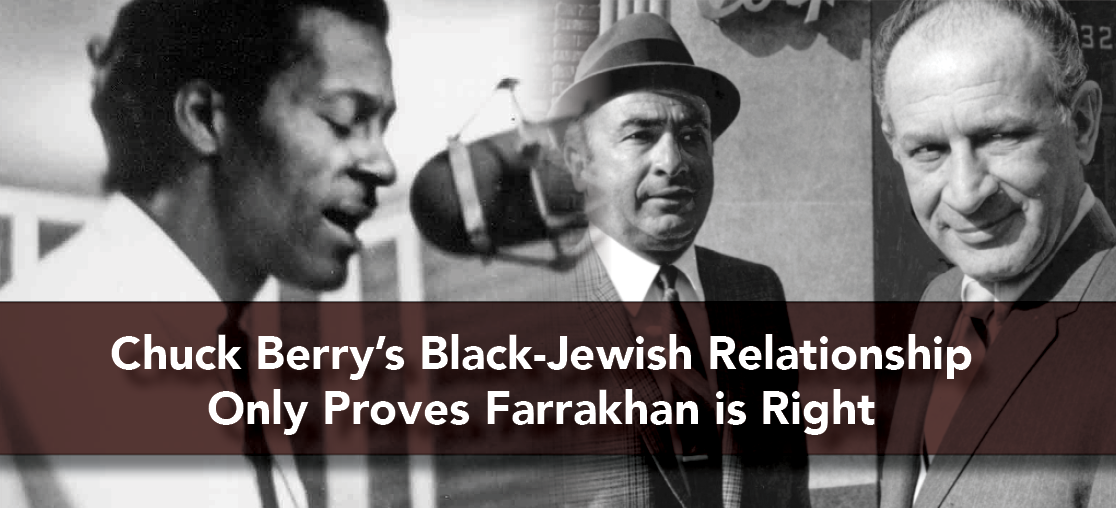Chuck Berry’s Black-Jewish Relationship Proves Farrakhan is Right
The Jewish Music Moguls Who Bled Millions from a Black Legend
Holy Quran, Sura 83:1-9
Woe to the cheaters!
Who, when they take the measure (of their dues) from men, take it fully,
And when they measure out to others or weigh out for them, they give less than is due.
Do they not think that they will be raised again,
To a mighty day? —
The day when men will stand before the Lord of the worlds.
Nay, surely the record of the wicked is in the prison.
And what will make thee know what the prison is?
It is a written book.
The recent death of the great Rock & Roll pioneer Chuck Berry at 90 years of age, and the “love” being showered upon him, offers us the opportunity to really understand the life and legacy of a music legend. As an artist in the 1950s, Chuck Berry was one of many brilliant Black guitarists playing an electrified urban blues style, a fraternity that included such greats as B.B. King, Elmore James, Muddy Waters, and Buddy Guy. But Berry infused enough of the country twang into his style to “cross over” to the much larger and more lucrative white market. The power of his signature guitar riffs ushered many of his white imitators into superstardom. Berry was pop music’s most influential sound and the very first inductee into the Rock & Roll Hall of Fame. Forget Elvis, forget the Beatles, forget Bob Dylan, forget the Rolling Stones—Chuck Berry is the King of Rock & Roll.
Though his music legacy is well established, far less known are Chuck Berry’s long and bloody battles with the cutthroats, exploiters, leeches, and piranha that infested the top rocker’s financial career. Seems that the big names now “paying homage” to a musical mentor were not just imitators—they were thieves. The Beach Boys were legally forced to give Berry a writing credit for their mega-hit “Rockin USA,” when it was shown to be a direct larceny from Berry’s “Sweet Little Sixteen.” The Beatles played Berry’s “Roll Over Beethoven” as their very first song of their very first American tour. Berry had to sue them for lifting the iconic “Come Together” from his song “You Can’t Catch Me.” Keith Richards of the Rolling Stones made the larcenous brag, “I lifted every lick [guitar riff] he ever played.”
The Honorable Minister Louis Farrakhan, himself a master musician and playwright, spoke harshly of this underworld that our entertainers must traverse if they wish to gain the fame and fortune they worked so hard to achieve. Here, The Minister serves up a word of warning:
“I think we have made a grave mistake; we have been deceived into thinking that the Jews have been our allies in our recent civil rights struggle….Yes, he poses as your friend. He’s with you as an agent, he’s with you as a manager, he’s with you as an investor, he’s with you as a guide in economic development, but he has never asked you to do what he has done. He networks with other rich, influential Jews and he buys, he invests, he’s in trade and commerce.”
Though the Anti-Defamation League (ADL) has showcased The Minister’s words as though they are manifestly untrue and “anti-Semitic,” Chuck Berry is the veritable poster boy for the reality that The Minister describes.
The pillaging of Chuck Berry’s talent began on his first foray into the music world, when he was lured into the orbit of the notorious Chess brothers of Chicago. Brothers Lejzor and Fiszel Czyz were the sons of Jewish immigrants from Poland. As so many Jews have done, they Anglicized their names, rechristening themselves Leonard and Philip Chess. They became liquor store and saloon owners in Chicago’s South Side, catering exclusively to Blacks, many of whom had made the trek from the South during the Great Migration. Between 1940 and 1960, the Black population in the city grew from 278,000 to 813,000. And many of these refugees brought with them a love for the Blues, a uniquely Black musical art form with roots in the deep plantation South. Leonard and Philip recognized the demand for that cultural genius and set up a recording studio to usurp its market potential.
Chuck Berry heard of Chess studios and in 1955 he signed a contract with them to make his first record Maybellene. The record hit big and Berry went on a national concert tour. Berry chronicled a series of financially questionable incidents in his 1987 memoir, Chuck Berry: The Autobiography (New York: Simon & Schuster):
- Chuck Berry’s contract guaranteed him sixty percent of the box-office income at each of his concerts, which would have paid him $750 (this is equal to about $9,000 in 2017 money), but he would only get $150 if the crowds were not large enough. Maybellene was the number 1 hit in America and the crowds were huge. Still, the “big beer-bellied bully” of a manager assigned to Berry by the Chess brothers kept telling him that “they just missed” the box office and so he was entitled to just $150. Berry started counting the audience while on stage and confronted the manager, who told Berry that if he wanted more he would have to “prove it.” Berry wrote: “the 10 percent of all income I was paying [Chess’s assigned manager] was not in the least being earned.” After catching the scoundrel cashing checks made out to him, Berry fired this “manager” and began managing himself.

- Chuck Berry saw the actual 45 record of Maybellene when his tour reached New York. It was stacked to the ceiling in boxes in the office of one of the Chess’s distributors. Berry noticed that two people he never heard of were listed on the record as co-writers! The names were Alan Freed, the crooked Jewish disc jockey implicated in the 1960s payola scandal, and another man named Russ Fratto, the landlord of the Chess office. And this “writer’s credit” would entitle those ghost swindlers to two thirds of the royalties, the sole writer and performer—Chuck Berry—receiving just one third. It seems that the Chess brothers perpetrated that open thievery as a bribe to Alan Freed to play their records on the radio, and as a payoff to Russ Fratto, a printer to whom the Chess brothers owed money. It took Berry until 1986—31 years—to get those slugs off the record credits, but not before Chess, Freed, and Fratto syphoned millions from Berry’s account. Today it is called identity theft, then it was called business.
- Berry wrote of Leonard Chess’s “tactics” of financial deception. Posing as Berry’s friend, Chess brought Berry out to a big breakfast, and then let Berry use his Eldorado Cadillac to visit a friend on the other side of town. When Berry got back to the Chess studio, he found that his band was backing up another artist in a recorded “audition” that ended up at the top of the pop charts. And you guessed it—with no compensation to the musicians or to Berry.
Chuck Berry lamented that his youthful enthusiasm and his hopes and dreams of becoming a recording artist caused him to enter into regrettable contracts with gangsters—all of whom “happen” to be Jewish—despite the clear guidance from both his parents. His father, a contractor, warned his son: “One must read and comprehend all obligations.” His mother’s advice was succinct and pointed: “Don’t let the same dog bite you twice.”
Berry, a very well-educated man, had all the musical talent, but he had to get costly on-the-job training to understand the intricacies of recording contracts and music publishing, royalties and percentages, copyrighting, recoupables, and service fees, and the ins and outs of doing business with booking agents, lawyers, and road managers. It begs the question, How could two Jewish saloon owners and liquor dealers, whose parents had so recently arrived from Poland, have obtained such a vast knowledge of the music business and the benefits of a national network of operatives at their disposal to then so smoothly and completely rip off so many Black artists?
Minister Farrakhan said that “he poses as your friend” in order to get access to your genius. One writer discussing the Chess legacy observed that the brothers had even adopted the Black man’s ways. The Chess brothers were “influenced by the jargon used by their performers, using black slang – often profane – in their business dealings….[T]he brothers’ speech was a mixture of heavy Chicago accent, with a hint of Yiddish and a lot of black expressions.”
And it gets even friendlier. Berry wrote of “a certain Jewish girl” who “suddenly showed up” at his concerts in deep dark Mississippi without a care about the racial codes of the 1957 American South. “She popped up in the most weird places,” Berry wrote, and exhibited an alluring behavior that he described as “too bizarre.” One might easily speculate that the “certain Jewish girl” was another of the Chess-assigned “managers” hoping to use her wiles to siphon even more of Chuck Berry’s wealth. Mossad has certainly found that tactic to be extremely effective.
The Chess brothers parlayed their ill-gotten gains into absolute control over the Chicago music scene and legacy. In 1963, they bought the radio station WHFC, which they renamed WVON—VON stood for “voice of the negro,” and it became a successful R&B station. Imagine that: two Jewish gangsters claiming to be the Voice of the Negro!
A Jewish writer acknowledged that the Chess operation could be compared to sharecropping, and ultimately it began to collapse around them. Chess was sued for underpayment of royalties by the great Howlin’ Wolf (Chester Burnett) in 1974, and again in 1976 by blues artists Willie Dixon and Muddy Waters (McKinley Morganfield). Howlin’ Wolf’s claim for $2.5 million was settled after his death. Dixon and Waters used their award to start their own label.

Can Farrakhan be more exact? Let’s look at his words again, as recorded by the ADL:
“I’m here to tell you no Black man or woman becomes a multi-millionaire without friendship in the Jewish community. Did you know that nearly all prominent Negro actors and musicians have or had Jewish sponsors and managers? They have a way of attaching themselves to your gifts, but you get nothing. They get it all.”
If anything, Chuck Berry was a fast learner. He was ultimately able to free himself from the clutches of those Jews he referred to as “swindlers.” At his recent passing Berry’s estate is said to be worth $50 million, and that includes publishing rights to most of his 200 songs, and royalties that could amount to $500,000 per year. He also invested in real estate all over the country. The irony is that his music made a talentless gaggle of schemers much, much more. The Chess brothers contributed to Jewish institutions and causes, which gladly turned a blind eye to the Chess brothers’ “fundraising” methods.
In his thoughtful and analytical 1987 autobiography, Chuck Berry went back to his St. Louis church roots in discussing the Chess brothers’ pillaging of his wealth and his talent: “Woe be unto him whose wrongs are revealed.”
Chuck Berry learned early that the press are unrepentant liars and so he stopped granting interviews. Read “CHUCK BERRY KNOWS FAKE NEWS” posted here: https://noirg.org/articles/chuck-berry-knows-fake-news/
Throughout his career Chuck Berry was a victim of white Culture Bandits and financial parasites. The outright theft and counterfeiting of Black talent and culture, and repackaging it for white audiences is not just profitable—it IS “white culture.” Read about this exploitation in the recently updated bestseller HOW WHITE FOLKS GOT SO RICH.


